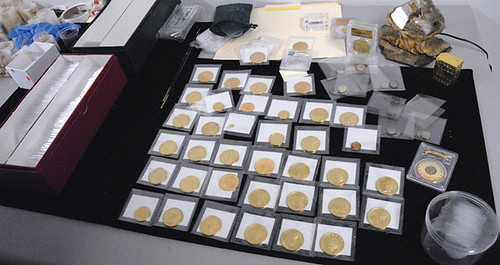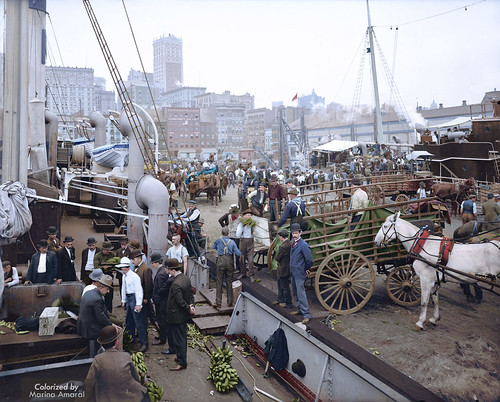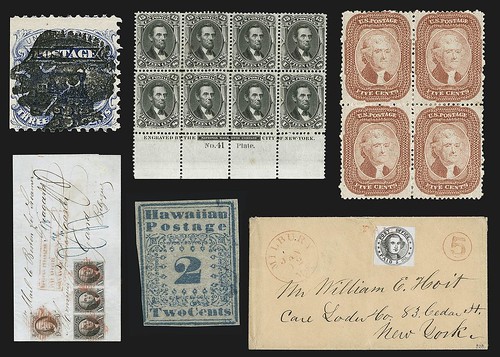
PREV ARTICLE
NEXT ARTICLE
FULL ISSUE
PREV FULL ISSUE
IN OTHER NEWS: MARCH 25, 2018Here are some additional items I came across in the media this week that may be of interest. -Editor
SS Central America: Science and Patience Coin World has published the third of six parts looking at the process of conserving the coins recovered in 2014 from the wreck of the SS Central America. Check out
the video. -Editor
 Evans makes it clear that each coin does not get the same amount of treatment. Though the solution is the same strength, some coins require more time for it to work, so some patience is required. Evans briefly relates a little about the chemistry of the solution being used to soak the coins free of the geologic deposits they acquired from their long stay on the seafloor, prior to their long-awaited display. To read the complete article, see: Latest Craze: Old Photo Colorization A different form of conservation is taking place in the world of photo colorizers. Here's an excerpt from an Atlas Obscura article published March 19, 2018.
-Editor
Adding color to historical black-and-white images isn’t a new phenomenon, but in recent years, a community of artists has emerged online as interest in their work has surged. In 2012, Danish artist Mads Madsen shared a portrait of a military general named Gershom Mott in full color, from the gleaming brass buttons on Mott’s uniform to the salt-and-pepper tones in his beard. The photograph looked as though it could’ve been a modern-day reproduction—yet the original was shot in 1864 during Mott’s service in the American Civil War, decades before the advent of color photography and more than a century before it became commonplace. As the photo made its rounds on Reddit, over a thousand commenters chimed in, many noting not only the image’s realism, but also the way it just seemed uncannily lifelike compared to static, black-and-white archival images from the era. “I love how colorized photos enable me to imagine these guys walking around today,” one commenter remarked. “I feel like I saw this guy at the store,” wrote another.  Banana docks, New York, ca. 1890-1910. MARINA AMARAL Amaral regularly receives messages from strangers thanking her for helping them gain a better understanding of historical images after seeing her work. “I’d say that’s the best compliment I can receive,” she says. Madsen, too, has heard from people who “are not really history fanatics, but have started enjoying history on a deeper level once they’ve seen colorization and how it affects the human mind,” he says. That’s not to say there isn’t backlash: Madsen says the artists are occasionally accused of “defiling” history, though he and his fellow artists see their work as more of a complement than a replacement. (For what it’s worth, color photography elicited its own fair share of raised eyebrows back in the day.) While purists may take umbrage at the idea of reworking history, there’s no question that these images have a powerful effect. Madsen describes black-and-white images as “sort of alien” in how they feel like relics from a bygone era. In grayscale, a historical photograph can feel trapped under museum glass. When color is added, Madsen says, everything changes. Wars waged, leaders assassinated, a nation’s greatest moments of pride and disgrace — color doesn’t just make these images attractive or more palatable. It throws its subjects’ humanity into high relief and forces us to see historical events as things that happened in real life to real people, not events that unfolded in the chapters of a history textbook. “Suddenly, it’s right there in front of you,” Madsen says. “You can almost feel it.” There aren't an awful lot of photos of numismatic interest outside of group photos of people at auctions and banquets. But there are many archival photos of people at work in
minting facilities, banks and banknote printing facilities. It would be quite interesting to see some of these colorized. I don't see it as defiling an artifact -it's an artistic
interpretation to be sure, but in the hands of a talented artist/craftsman, the results can be both historically accurate and powerful emotionally. See the complete article for some wonderful
colorizations. -Editor
To read the complete article, see: Bill Gross Selling Stamp Collection Martin Kaplan forwarded this Bloomberg article about our sister hobby of philetely - the King of Stamp Collectors is putting his collection on the auction block.
 Bill Gross gained fame as the bond king. Now he rules the market for collectible stamps. His $42 million collection of U.S. postage is so comprehensive that when the first part of it comes up for auction in September, the entire field of philately will feel the effect. “There’s never been a collection in private hands of U.S. material like the one Bill Gross put together,” says Cheryl Ganz, curator emerita of the Smithsonian National Postal Museum in Washington, which got more than $10 million from Gross’s family to build the William H. Gross Stamp Gallery, the world’s largest gallery dedicated to postage. “He went for the best of the best in every case.” To read the complete article, see: 1952 Mickey Mantle Baseball Card Offered Martin Kaplan also forwarded this ABC news article about the upcoming sale of another collectible - a rare 1952 Mickey Mantle baseball card.
After retiring from the NFL a little more than a year ago, Evan Mathis decided to move closer to where he grew up in Alabama. And to get the kind of house he and his wife wanted, Mathis needed to free up some money. And that meant the avid sports card collector would have to part with his prized possession: a 1952 Mickey Mantle baseball card. "Just that image of the young Mickey Mantle, over the years it's been a centerpiece of the hobby," Mathis told The Associated Press by phone. "I guess it's kind of like the Mona Lisa of the sports card world." Issued as part of its first set of baseball cards by Topps, the Mantle card is the marquee piece of a card-only spring collection by Heritage Auctions. It is one of six versions of the card to have been rated a Mint 9 by PSA, one of the leading sports memorabilia authenticators, with three others having earned a Mint 10 rating. The card has been estimated by Heritage to be valued at $3.5 million. For comparison, the highest price paid for a card at auction was $3.12 million two years ago for a 1909 Honus Wagner card. Unfortunately, the article doesn't picture the card. It's worth reading for its parallels to numismatics - condition, rarity and horsetrading among collectors.
To read the complete article, see: Dumb questions? Not really Back to numismatics: I really enjoyed Pat Heller's March 22, 2018 Numismatic News article, "Dumb questions? Not really". See the complete article
online.
Experienced collectors and dealers have pretty much all been asked what might be construed as dumb questions about coins or paper money by non-collectors. There are hundreds, if not thousands, of such questions, but here are a few examples: “How much is the gold worth in these gold dollars?” (referring to the Native American and U.S. Presidential dollars issued this century that are yellow in color but do not contain a speck of gold content despite the U.S. Mint’s marketing campaign calling them Golden Dollars). “What is this really old coin worth?” (which could be a currently circulating coin that was minted in the 1980s or 1990s, something that might actually seem really old from the perspective of the child asking the question). “Can you give me $1,000 in currency for this $1,000 coin?” (which could be a coin from Mexico dated before that country dropped three zeroes from their money in 1993, where the coins use the dollar sign to signify pesos, hence coins that depict “$1000” now have an exchange value just over five cents in U.S. money). Take a moment and think about the best way to respond to what might be considered dumb questions if someone asks you one. Sure, it would be easiest to give a quick answer of the item just being current spending money, a fake, a replica or counterfeit, a token or medal, or a minor coin or currency of virtually no value (whichever may be the circumstance). But what difference would it make if the collector or dealer were to take a little more time to acknowledge that the person was being intelligent by seeking information on the item and its possible value, then go on to share some background numismatic information that just might spark the interest of a new collector? To read the complete article, see: A Tour of NGC Ursula Kampmann of CoinWeekly recently visited Numismatic Guaranty Corporation in Sarasota, Florida. Check out her well-illustrated article.
To read the complete article, see: Wayne Homren, Editor The Numismatic Bibliomania Society is a non-profit organization promoting numismatic literature. See our web site at coinbooks.org. To submit items for publication in The E-Sylum, write to the Editor at this address: whomren@gmail.com To subscribe go to: https://my.binhost.com/lists/listinfo/esylum All Rights Reserved. NBS Home Page Contact the NBS webmaster 
|